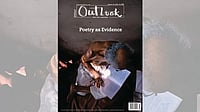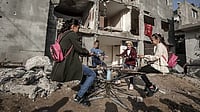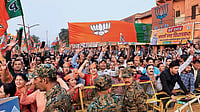How do you judge the UPA’s handling of Pakistan post-9/11?
India-Pakistan relations are given to frequent fractures. They are possibly the most complex relations between any two countries on earth. They are hostage to high emotions and history as no other. In India-Pakistan relations, the past is also the present.
Do you think the UPA government has handled the aftermath of Mumbai 26/11 competently enough?
Don’t ask me to make judgements. The other aspect of 26/11 was that for 70 hours the country was brought to a standstill and all decision-making came to a stop. The problem arises when the political leadership abandons responsibility and leans on a foreign power to do its job.
There was massive troop mobilisation during the NDA years. On the other hand, the UPA has obtained an admission of culpability from Pakistan without any mobilisation...
Such comparisons are unfair as there is no equivalence. The attack on Parliament had been preceded by so much else...the attack on the J&K assembly, cross-border terrorism. The Lahore bus journey of Vajpayee had been followed by Kargil, and Kargil by Kandahar. Yet Atalji had got that commitment from Pervez Musharraf that Pakistan will not permit its soil to be used for any act of terrorism against India. For UPA, absence of policy is policy.
Yet Pakistan has cooperated...
For two months Pakistan mocked India’s concerns. It was galling. Then within 48 hours of US special envoy Richard Holbrooke’s visit, Pakistan conceded that its citizens were involved in 26/11. It was a charade and it would be a great error on our part to put it on the credit side for India.
Who would you give credit to?
The international community took interest post-Mumbai only because their citizens were also affected. That is the harsh reality. Let us not forget that the Americans are caught in a bind. They have destabilised the region and are trying to retrieve something for themselves. They will leave eventually because their county is 8,000 miles away, but till then, they are destabilisers in the region from Pakistan to Iraq. But that part of the world is just eight and a half minutes from us. If, under these circumstances, we begin to crow victory simply because Pakistan has made an admission under US pressure, we are making a terrible mistake.
Do you think the BJP-led NDA was right in building up troops on the border after the Parliament attack?
Well, I would certainly not defend Operation Parakram. I was not in India when the decision was taken, but do not wish to say anything more.
Vajpayee had made political capital out of Pakistan and now the Congress intends to do so. The BJP is not striking the right note on Pakistan...
In a democracy, politics is inevitable. But statements like Narendra Modi’s saying that locals were involved in 26/11 have been twisted. I too say that an operation like Mumbai 26/11 is impossible without local help. The BJP remains convinced that we have more experience in dealing with Pakistan. Pakistan has also said so repeatedly.
Would you please tell us about the Kandahar episode?
When governments are faced with a choice between two great wrongs and a decision has to be made instantly, such things do happen. The decision to accompany the five released terrorists was a practical decision. The Kandahar airfield was Taliban-controlled, and the ATC was speaking only in Pushtu or Dari. There were already three Indian airlines aircraft waiting there—the hijacked plane, one relief aircraft, a third with technicians. The clock was ticking away and there was need for a political leader to take decisions.
Pakistan is such a big concern and you are said to be working on a book on Mohammed Ali Jinnah.
The book is ready, but I do not wish to create a controversy before the elections. I will release it after the elections. I have worked for four-and-a-half years on it. It’s a serious work, but I feel it won’t be read as such. So when it comes out, I’ll be ready for a controversy. Perhaps we need controversy to educate people. I am still toying with titles. The book is about Jinnah’s journey from being an ambassador of Hindu-Muslim unity to the Qaid-e-Azam of Pakistan.


























